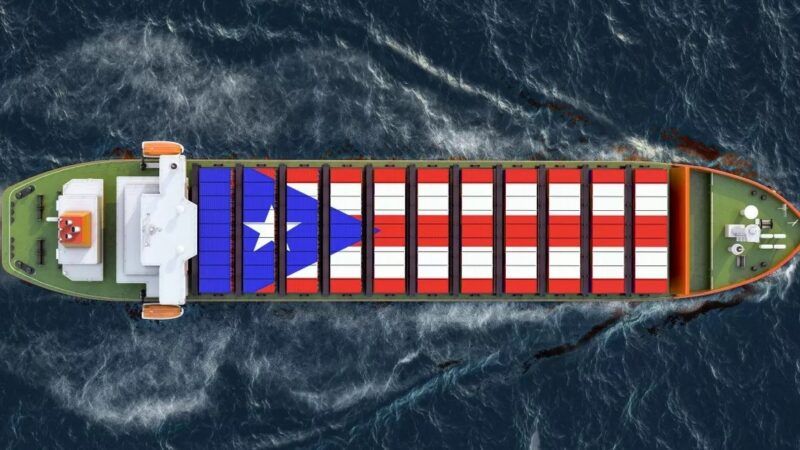This Military Spending Bill Will Make Puerto Rico's Next Hurricane Disaster Even Worse
The maritime industry inserted some protectionism into the National Defense Authorization Act.

When Hurricane Fiona hit Puerto Rico, leaders of domestic maritime industry companies were furious when President Joe Biden's administration gave a single foreign ship laden with diesel oil a waiver to bypass federal regulations and dock in Puerto Rico to help the island's recovery efforts.
The Jones Act (technically the Merchant Marine Act of 1920) requires that all ships that deliver goods between U.S. ports be built within the United States, owned and operated by U.S. companies, and crewed by U.S. citizens. It's a protectionist, anti-competitive law that shields domestic shipping companies from foreign competition.
Exceptions and waivers from the Jones Act are hard to come by, and thanks to the 4,300-page 2023 National Defense Authorization Act (NDAA), on its way right now to get the president's signature, it's about to become even harder. A section of the bill (buried down on page 1,724) adds new restrictions and even a time delay to make it more challenging for government officials to offer a waiver, even during times of crisis.
The Jones Act drives up prices for domestic shipping because it severely restricts which ships can engage in trade between domestic ports. There are fewer than 100 Jones Act–compliant cargo ships. The fiscal impacts are most pronounced in far-flung parts of the United States, like Alaska, Hawaii, and Puerto Rico, who end up paying more for just about everything. But when a crisis hits these areas, and demand for goods and fuel goes up—like when Puerto Rico is hit by a hurricane or the northeast U.S. is hit with an extremely cold winter—the effects of the Jones Act can make the crisis even worse.
The Jones Act has a process that allows for individual ships to receive exemptions in cases of disasters or threats to the national defense. Multiple presidential administrations have very rarely pursued these exemptions, and when they do, representatives of the industry insist they're not needed.
In 2020's NDAA, an amendment to the Jones Act was squeezed in to require that there be "an immediate adverse effect on military operations" in order to grant an emergency waiver. Otherwise, officials need to prove that Jones Act–compliant ships aren't enough to respond to a crisis before offering waivers, as the Biden administration did in the aftermath of Fiona.
Now, the Jones Act is being amended again with even more restrictions. Under these new rules, pushed by the industry itself, there will be a mandatory 48-hour delay before a waiver can be approved and published. And a ship that is already laden with cargo cannot seek out a waiver at all. So in the aforementioned Puerto Rico example, a foreign ship that is already full of fuel and available cannot respond to an emergency situation if it has already made one stop at a U.S. port.
Colin Grabow, research fellow for the Herbert A. Stiefel Center for Trade Policy Studies at the Cato Institute, points out how places like Puerto Rico and the northeast will suffer under these rules:
Imagine, for example, a ship sailing to Europe laden with U.S. fuel while New England is experiencing an energy shortage. With the new restrictions in place, any such ship not complying with the Jones Act's requirements—which is to say, the overwhelming majority of the world's ships—would be ineligible for a waiver enabling it to divert to a New England port to discharge its much‐needed cargo. Rather, any non‐compliant ship would first have to be empty of U.S. cargo, apply for a waiver, and then wait at least 48 hours for it to be granted before supplies could finally be loaded and the vessel proceed to where it was needed.
These are deranged, nonsensical restrictions that are precisely for the purpose of protecting a domestic cartel with a lot of influence over the federal government. The fact that this rule was recommended and passed actually demonstrates the sorry state of the industry. If any other service or industry operated with such restrictions on competition, we'd see it for what it is. The domestic maritime industry can't compete on price or availability, so it's forcing regulations that drive up the prices and restrict the availability of foreign ships. Rather than improving their own services and efficiency, they're making things worse for their competitors.
Grabow warns, "If existing law prevents foreign ships loaded with U.S. fuel or other critical supplies from speeding relief to Americans during times of emergency, plainly Congress's priority should lie in providing increased flexibility and removing such obstacles. What it's now doing is the complete opposite."
With the support of Biden and his administration, these new restrictions will pass and guarantee that Puerto Ricans will suffer even more next time a hurricane hits.

Show Comments (11)